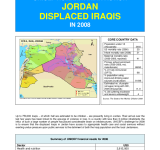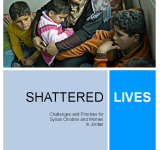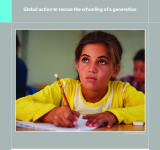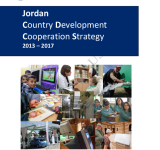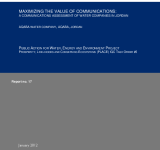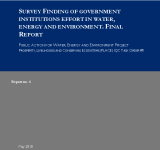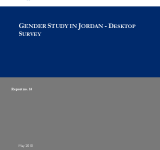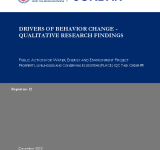education
With an executive summary on the Syrian refugees situation in Jordan;; the report combines the conclusions of detailed assessments in various areas including as child protection and gender-based violence;; education;; water sanitation and hygiene;; and nutrition and health. It provides a holistic picture of the situation faced by Syrian children and women in Jordan to draw out recommendations for necessary plans of action. Some key findings of the report include growing challenges for water;; sanitation and hygiene situation in Za’atari camp;; several threats to the nutritional status and health of Syrian girls;; boys and women and increasing violence against adolescents. Bringing together the voices of children and women at the camps;; the report examines the situations of Syrian refugees in host communities and refugee camps and finds key recommendations based on them.
The report assesses the practical challenges of education and schooling for the Syrian children in refugee camps in Jordan;; Lebanon and Egypt as the Syrian Crisis prolongs. It argues that ensuring the continued access to learning is an essential platform for protection;; social stabilization and economic recovery that the international community should not ignore. The report also includes important figures and statistics revealing the alarming situation of education and school. Some of the key statistics are the host-country school-age children compared to Syrian school-age children;; Syrian children enrolled in public schools in Lebanon and Jordan and school-age Syrian refugee children in and out of school by countries such as Iraq;; Egypt;; Turkey;; Jordan and Lebanon. The report concludes with four key recommendations to be undertaken by regional governments and their international partners so that the fundamental right to quality education can be guaranteed to the Syrian children.
Defining the goal as improved prosperity;; accountability and equality for a stable;; democratic Jordan;; the strategy report highlights a long-standing partnership between Jordan and the United States. Amidst a number of challenges;; Jordan continues to play a strategic ally in the region and therefore;; the report stresses the importance of assisting Jordan in carrying out its stated commitment to broad-based political and economic reforms. The three development objectives are 1. Broad-based;; inclusive economic development accelerated;; 2. Democratic accountability strengthened;; and 3. Essential services to the public improved;; with a special development objective of gender equality and female empowerment enhanced. According to the report;; the key theme of the strategy is complementing support for Jordanian-led structural reform with grassroots activities of more visible and more directly “felt” people-level impact. The development objectives find specific areas of focus that need the USAID investments and support.
The report is based on the study designed to conduct a communications assessment of Aqaba Water Company;; one of the key water utilities in Jordan and to examine how its communications department collaborates with other areas of the organization. As part of the Public Action for Water;; Energy and Environment Project (PAP);; a public education and behavior change communication program developed to support USAID’s technical and policy investments in the Jordanian water and energy sectors;; the report finds that the effective communications can save the utility money by improving operations;; increasing efficiencies and reducing customer complaints. The report suggests that the strategic communications can be the key to a sustainable future for the kingdom during the times of critical resource constraints and presents some guiding principles and recommendations for the Aqaba Water Company’s communication efforts.
The report presents the findings of the government institutions efforts survey;; which is designed for the purpose of reviewing the government agencies’ current and past communication activities in water;; energy and environment. The specific objective of this survey is to review the Donor Position Paper on Outreach targeted sample of 36 staff from 22 government institutions from Aqaba and Karak. As part of the Public Action for Water;; Energy and Environment Project (PAP);; a public education and behavior change communication program developed to support USAID’s technical and policy investments in the Jordanian water and energy sectors;; this report finds that many government institutions have more than one role;; overseeing solid waste management;; industrial water and reuse and environmental laws. The report also finds that the communications programs are scattered and credibility and trust between service agencies and their clients is a concern. The interview analysis suggests that the Public Action Project needs to focus on two or three specific areas;; and the report recommends all capacity building activities to be focused on one goal of developing;; implementing and measuring national communication strategies and action plans.
The report presents the findings of a desktop survey conducted to review gender studies in Jordan with an overall goal of the survey as to ensure that gender is adequately addressed throughout project research;; analysis and activities of the Public Action for Water;; Energy and Environment Project (PAP). Under the PAP mandate to encourage water and energy conservation and to support behavior change towards more conservation and efficient practices both at the household level and in the commercial;; industrial and civil society arenas using social marketing behavioral methods;; the report is based on a gender desktop review of existing research on gender and natural resource management in Jordan. It capitalizes on the growing body of research on gender across sectors in Jordan including natural resource management;; to apply and adapt the findings to the PAP project activities. The report concludes with recommendations for the PAP projects such as donor collaboration;; improvement of women’s knowledge of water and energy saving methods;; engagement and creation of women’s participation to promote and support opportunities for small;; women-owned business promoting water and energy saving technologies and promotion of alternative technologies.
The report aims to understand the outlook of Jordanians;; the key determinants of behavioral change in search for “drivers” that can be used in programs promoting conservation of water or energy and reduction of solid waste. This research was conducted as part of the Public Action for Water;; Energy and Environment Project (PAP);; which aims to encourage water and energy conservation and to support behavior change towards more conservation and efficient practices both at the household level and in the commercial;; industrial and civil society arenas using social marketing behavioral methods. It is based on the qualitative research that focuses on identifying people’s motivations;; needs and desires to help formulating social marketing programs and developing adaptive capacity in individuals and groups. Some of the key questions of the qualitative research include “What are the current coping behaviors and attitudes (psychological;; social;; etc …) of the Jordanian public (disaggregated by gender;; age;; geography and income) in the face of limited water availability and high prices for energy?;; What anticipated consequences may the Government face if stricter scenarios were imposed on water and energy? The report recommends the Ministry of Education to cooperate and introduce regular classes that focus on showing youth the direct impact of water;; energy and environment on their lives and raise awareness and consciousness of children regarding their role in the environment and influence it in a positive way.
